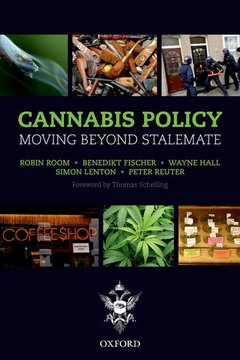Cannabis Policy Moving beyond stalemate
Langue : Anglais
Auteurs : Room Robin, Fischer Benedikt, Hall Wayne, Lenton Simon, Reuter Peter, Feilding Covenor: Amanda

Cannabis, marijuana, pot, ganja - it goes by many names -- is by far the most widely used illegal substance, and accounts for more arrests than any other drug. Barely a week goes by without this drug appearing in the newpapers, and politicians have famously tied themselve in knots, trying to decide just how to deal with this recreational drug. While there have been many drug policy books on other substances - both legal and illegal, few have focused on this drug. Cannabis Policy: Moving beyond Stalemate is unique in providing the materials needed for deciding on policy about cannabis in its various forms. It reviews the state of knowledge on the health and psychological effects of cannabis, and its dangerousness relative to other drugs. It considers patterns and trends in use, the size and character of illicit markets, and the administration of current policies, including arrests and diversion to treatment, under the global prohibition regime. It looks at the experience of a number of countries which have tried reforming their regimes and softening prohibition, exploring the kinds of changes or penalties for use for possession: including depenalization, decriminalization, medical control, and different types of legalization. It evaluates such changes and draws on them to assess the effects on levels and patterns of use, on the market, and on adverse consequences of prohibition. For policymakers willing to look outside the box of the global prohibition regime, the book examines the options and possibilities for a country or group of countries to bring about change in, or opt out of, the global control system. Throughout, the book examines cannabis within a global frame, and provides in accessible form information which anyone considering reform will need in order to make decisions on cannabis policy (much of which is new or has not been readily available). This book will be essential for those involved in policymaking and be of interest to a wide range of readers interested in drugs and drug policy, as well as being an excellent supplementary text for university courses in criminology, policy science, social science, or public health. Published with the BECKLEY FOUNDATION PRESS
Foreword by Thomas Schelling. Preface. Part I: Cannabis Policy: Moving beyond Stalemate. 1. Introduction. 2. The Health and Psychological Effects of Cannabis Use. Annex : Health Advice on Cannabis Use. 3. The Cannabis Prohibition Regime: Patterns of Use, Markets and Policies. 4. The Range of Reforms within the System: Softening the Prohibition. 5. The Impacts of Cannabis Policy Reforms within the Current Drug Control Regime. 6. Beyond the Current Drug Conventions. 7. Paths Forward from the Impasse. Part II: Conclusions and Recommendations. Annex: Research Priorities. Part III: Draft Framework Convention on Cannabis Control. References. About the Authors and the Beckley Foundation.
Robin Room grew up in Sydney, Australia and received his higher education in the U.S., with a PhD in sociology from the University of California, Berkeley. He was the Scientific Director of the Alcohol Research Group in Berkeley, a U.S. National Alcohol Research Center, from 1977 to 1991, and then the Vice-President for Research at the Addiction Research Foundation of Ontario, Canada, from 1991 to 1998. In 1999 he was appointed as a professor and the founding director of the Centre for Social Research on Alcohol and Drugs at Stockholm University. Since March, 2006, he has been a Professor in the School of Population Health of the University of Melbourne and the Director of the AER Centre for Alcohol Policy Research at Turning Point Alcohol and Drug Centre. He has worked on social, cultural and epidemiological studies of alcohol, drugs and gambling behaviour and problems, and studies of social responses to alcohol and drug problems and of the effects of policy changes. Simon Lenton PhD MPsych(clin) is a Professor and Deputy Director at the National Drug Research Institute, in Perth Western Australia where he has worked since 1993. He also works part time as a Clinical Psychologist in private practice specializing in drug issues. Simon previously worked in the government alcohol and other drug sector as a clinical psychologist and manager. His research interests include bridging the gap between drug policy research and drug policy practice, illicit drug use and harm reduction, impact of legislative options for drugs, and drink and drug driving. He has published more than 30 scientific articles, book chapters and reports on cannabis, health and the law and presented on the topic at numerous national and international conferences. Peter Reuter is Professor in the School of Public Policy and in the Department of Criminology at the University of Maryland. He is Director of the Program on the Economics of Crime and Justice Policy at the University and also Senior Economis
Date de parution : 01-2010
Ouvrage de 256 p.
15.6x23.3 cm
© 2024 LAVOISIER S.A.S.



